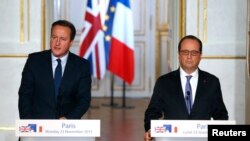British Prime Minister David Cameron will begin to lay out his case this week for the Royal Air Force to start hitting Islamic State targets in Syria, something he has been eager to do but feared being blocked by Parliament.
Speaking in Paris on Monday after meeting French President Francois Hollande, Cameron said the two leaders agreed to increase counterterrorism cooperation after the attacks. He called for greater European Union-wide efforts to share intelligence to stop extremists and offered the use of RAF Akrotiri on Cyprus for anti-Islamic State actions in Syria.
"The United Kingdom will do all in our power to support our friend and ally France to defeat this evil death cult,'' he said.
A careful approach
Cameron lost a vote in Parliament two years ago to allow attacks on Syria, and has been reluctant to even suggest a vote until he could be certain to win. The RAF is already participating in airstrikes in Iraq.
Cameron has argued that Britain's "precision missions'' would allow better targeting and lead to fewer civilian casualties than American weapons. Britain's arsenal includes the Brimstone missile, whose technology enables it to ensure accuracy against moving targets, such as gun trucks used by Islamic State group militants.
Defense Secretary Michael Fallon told the BBC that Britain had capabilities to offer the coalition.
"We have a highly skilled air force. The Tornadoes that we have been deploying in Iraq have a high-precision missile, the Brimstone missile, that nobody else has, that reduces, eliminates, civilian casualties because it is so precise,'' he said. ``The rest of the coalition would like to see the RAF engaged in Syria. It makes very little sense for the RAF to be able to fly as far as a border between Iraq and Syria that [the Islamic State group] itself does not recognize.''




